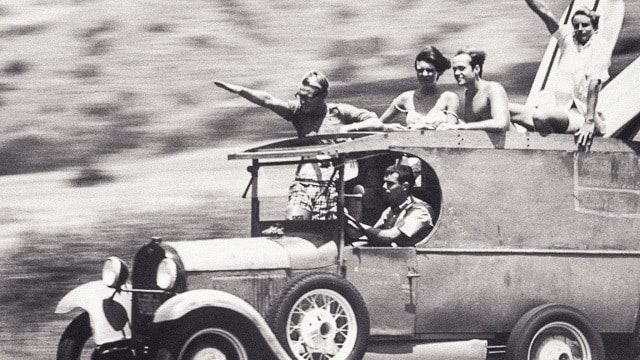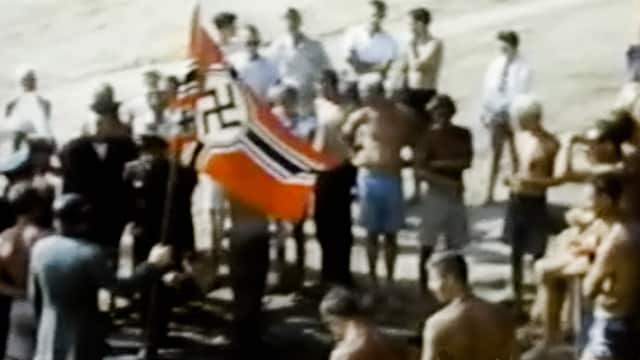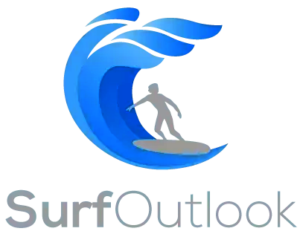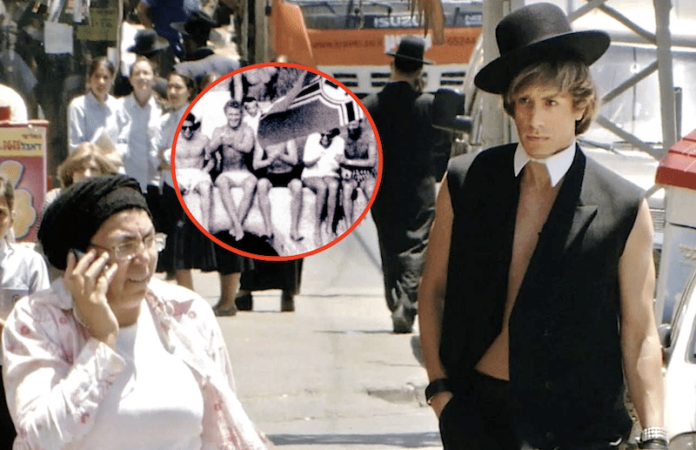“I have had my car windows waxed for being a non-local, I’ve been blasted as a surfing feminist. But any Jew Boy stuff? Fifty-plus years in surfing and nothing. I mean, zero.”
I am three-quarters Jewish and 100% non-practicing. I act the Jew now and then by mentioning my brother played volleyball in the Maccabi Games, and that Irv Zeiger, our family’s beloved showboating uncle, cofounded the Mulholland Tennis Club because Jews were barred from other Los Angeles-area clubs.
But I never attended synagogue or fasted for Yom Kippur or celebrated Hannukah. No bar mitzvah. My loss there, I think. The bar mitzvahs I’ve attended were all an absolute joy, spiritual and earthy, solemn and playful, with a vice-free raging good time at the party afterward.
A short trailer for the new documentary Waves Apart shows filmmaker Josh Greene, ten years ago, having what looks like an absolute banger of a bar mitzvah party. Josh was still new to surfing at the time, but crazy for it, in that obsessive memory-stamping 13-year-old way, and his parents made a fledging dream come true by booking the Surfing Heritage and Culture Center for the party. And there’s Josh, mid-hora, happily chair-raised above friends and family and spinning around the SHACC museum floor with beatified surfboards made by Quigg, Hobie, Lopez, and Anderson propped against the walls in the background.
The trailer then takes a dark turn—literally, the music drops to minor key and the video shifts from color to ominous black and white—and you surf history buffs know what’s coming, because next thing we get is a tight zoom on a SHACC-owned Depression era redwood board with a swastika engraved on the deck, then a black-and-white photo of grinning Aryan-looking kids tearing down Pacific Coast Highway in their surf-wagon doing Hitler salutes, then a color clip of ’50s surfers on the beach in La Jolla holding a Nazi flag.
“I thought surfing would let me get away from this kind of hate,” Greene says in a voice-over, and the trailer ends.
I have not seen Waves Apart which is still playing exclusively at festivals. It is possible Greene has a thematic surprise up his sleeve and the movie will surprise by going in a different direction from the trailer. I hope that’s the case, and if so I’ll report back.
But my guess is the film does exactly what the trailer promises—and that’s hardly a guess at all because Greene himself claims Waves Apart will “confront a dark untold history” of surfing. A Jewish Telegraphic Agency article reports that Greene “discovered the sport’s history is full of Nazi imagery: Particularly in the 1960s, seeing surfboards with swastikas or surfers giving ‘Sieg heil’ salutes was commonplace. Serious surfers called themselves ‘surf Nazis’ as a way to signal their intense dedication to the sport.”
So here I am again playing the Jew card, because my reading of surf history is very different than that of Greene’s, and if you think we’ve been down this road before, you’re right, but the past is never dead etc, so let’s get into it.
There are antisemites in surfing. They are everywhere, always have been, and antisemitism in general is on the move so add that sprig of nightshade to the enviro-political-cultural bouquet of woe we’re holding here in 2023.
But as sure as I am about antisemites in the sport, I’m equally sure surf-based antisemitism in general is below that of the culture at large. Well below, in fact, although I can only argue the point anecdotally.
Or non-anecdotally.
As in—I’ve never heard of a Jewish surfer being refused service or turned away from a surf shop, or barred from a surf club or organization. I’ve never heard of a Jewish-owned surf company being graffitied, bricked, hacked, or otherwise damaged. I’ve never heard of a Jewish surfer being asked to leave the water for being Jewish. There was never a point in surf history, contrary to what the JTA reports, and I can’t believe we have to clear this up, when surfers greeted each other with Hitler salutes.
Similarly, I have had my car windows waxed for being a non-local, I’ve been blasted as a surfing feminist (a “feminazi” no less; it was the ’90s), and grilled by the BeachGrit commentariat for leaning hard left then grilled again for not surfing as much as I used to. I was nicknamed “Wimpy” as a kid by my Zephyr teammates because I was small and thin and scared of big waves. Because “Warshaw” is close to “Warsaw” I drew fire on the schoolyard for being Polish—which I’m not.
But any Jew Boy stuff? No. None. Fifty-plus years in surfing and nothing. I mean, zero.
Again, though, my Jewishness is turned way down, so maybe my experience doesn’t count for much.
Surfers I know who identify more strongly as Jewish, however, all report more or less the same thing. In a batch of emails sent out last week on the topic, the most interesting reply I got was from Emmy-winning documentary filmmaker Paul Taublieb:
“In terms of antisemitism, nothing blatant or discriminatory, but over the years it’s been pointed out at times as an oddity in that there’s not a lot of us in the sport. So it’s more of an undercurrent of being just a tad different—and a sense that others are very much aware of it.”
That makes sense.
But could you make a documentary about it? Not a chance.
Surf history is ugly and shameful in places, beginning with the sport’s treatment of women and moving out to surfing newcomers, and a knee-jerk dislike of those who ride different equipment or aren’t part of the local crew. Predating and concurrent to all of that, however, and very much present to this day, surfing is a sport of refuge.
Disease, coup, and blue-eyed repression of every kind knocked Hawaiians down to second-or third-class citizens everywhere except in the lineup, where they continued to reign. Tom Blake, Bob Simmons, George Greenough, Henry Lum, Dorian Paskowitz—surfing has always taken in damaged people, oddballs, outliers. You could argue, in fact, that in terms of surfing’s contribution to society, this is our greatest redeeming quality—maybe our only redeeming quality. When we change the focus slightly, from antisemitism to racism, we get to photographer Aaron Chang and his summary on how riding waves, contrary to actual playing fields, leveled the playing field.
“Going to school here in San Diego, I encountered huge amounts of racism. It was a big part of my life growing up. Really destabilizing. Vicious taunting from white kids about the shape of my eyes, that kind of thing. Surfing was the saving grace for me during that period. In surfing, it was pretty much just ability.”
Before signing off, let’s quickly run through the hot-button Waves Apart visuals.
SWASTIKA SURFBOARD
The Swastika Hawaiian Surf-Board model, as seen in the trailer, was made by the Los Angeles-based Pacific System Homes, makers of build-it-yourself kit homes. The board was introduced in 1930, and the swastika logo, chosen because it represented “health and good fortune,” according to the grandson of Pacific System founder William Butte, was dropped in 1937 or 1938, around the time Germany rolled into Austria. You could argue that Pacific System marketers should have ditched the swastika a year or two earlier, but I’ve not picked up even the faintest hint of Nazi from Pacific System Homes or the Butte family. Unlike, say, Henry Ford, JD Rockefeller, Coca-Cola, IBM, and Kodak, who were not 100% full-frontal red-and-black Nazi but were very much not anti-Nazi, either.
SURFERS ON PCH THROWING NAZI SALUTES

Click here for Bob Feigel’s take on the photo—he’s the glasses-wearing blond in front, leading the charge.
NAZI FLAG ON THE BEACH IN LA JOLLA

Grouping this with the PCH shot and let’s acknowledge that we’re in a tricky place here in terms of making distinctions between antisemitic dress-up and the real deal. The line between the two, as I learned four years ago when we last had this conversation, changes from person to person. Something I would dismiss as boneheaded Nazi cosplay, you might read as a genuine Nazi-adjacent cause for worry, and I will not argue the point. Especially not in 2023. (I didn’t much argue the point back in 2017, either, although I was fine with Ed “Big Daddy” Roth and his Nazi-inspired “Surfer’s Cross” pendant.) Click here for an excellent but already slightly out-of-date look at the history and perils and fungibility of Nazi humor, which in a roundabout way gets us to Miki Dora, and where we position him on an antisemite scale ranging from pretender to dabbler to villain. At the moment I’ll go with villain but it depends on what day you ask me, and I’ve got Jewish surf friends who give him a pass—and what we have there, folks, is a documentary waiting to be made.
PS: Doc Paskowitz died in 2014, age 93, but the Paskowitz clan he headed is still referred to as the First Family of Surfing, and since we’re talking about Jewish-based surfing documentaries, let me once again recommend in the strongest terms possible 2007’s Surfwise. And before stepping down off this soapbox, I’ll point out that while Judaism comes up here and there throughout Surfwise (“We were born,” #9 Paskowitz offspring Abraham says to the camera, “because Doc wanted to repopulate the world with Jews”), and apparently, no subject is off limits in the film (war, social status, mental and physical abuse, and sex, way too much sex; “Fucking, to me,” Doc says, “is the word of God”), there is no mention, not a word, all through it’s rampaging 90 minutes, of surfing-related antisemitism.
PPS: Ditto “Why Jews Don’t Surf,” a 1980 H2O magazine article, likely written by Santa Monica surfer and one-time Jewish scholar Marty Sugarman, which is a hot mess start to finish but pointedly leaves antisemitism off the table.
PPPS: Thanks to Greene’s film, “surf nazis” Google search now gets us a dozen or more new hits, so for the record: “surf nazi” was used among surfers briefly in the late ’70s and early ’80s to describe somebody who surfed a lot. It was no more a direct adaption of Nazism than the Soup Nazi on Seinfield Soup. It was long out of circulation by the time Surf Nazis Must Die had ’em laughing and cringing at Cannes in 1987.
(You like? Matt Warshaw delivers a sassy surf essay every Sunday, PST. All of ’em a pleasure to read. Maybe time to subscribe to Warshaw’s Encyclopedia of Surfing, yeah? Three bucks a month.)





